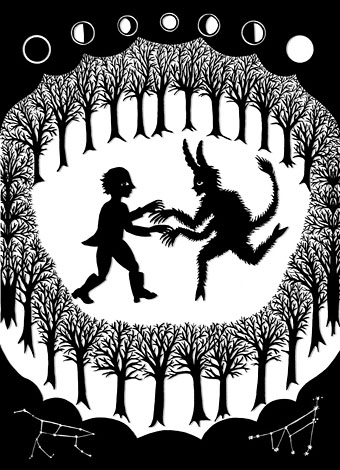The Devil in the Green Coat by Andrea Dezsö, an illustration for a new, uncensored edition of the Grimm Brothers’ Fairy Tales.
• That { feuilleton } object of cult attention, Penda’s Fen, a 1974 television film by David Rudkin directed by Alan Clarke, continues its long journey out of the shadows. To coincide with a screening in London of a 16mm print, Sukhdev Sandhu looks back at a unique drama, and examines its connections to other British films of the period. There’s still no sign of a DVD release although rumours persist. Related: Penda’s Fen at A Year In The Country.
• “One of the reasons I’m sure I found the horror genre congenial is that it’s almost always focused on the body. The body is the center of all horror films.” David Cronenberg talking to Calum Marsh about his novel, Consumed.
• Mix of the week: Antony Hegarty’s Future Feminist Playlist, and Secret Thirteen Mix 134 by James Ginzburg & Yair Elazar Glotman. Related: Nimbes by Joaniele Mercier & James Ginzburg.
• Another week, another Kickstarter: Suzanne Ciani: A Life in Waves is a planned feature-length documentary about the American synthesist and composer.
• “[Marjorie] Cameron’s connections to Scientology and powerful men once drew headlines, but now her art is getting its due,” says Tanja M. Laden.
• Jay Babcock found a Hawkwind Tarot spread in International Times for 1971. Is this an overlooked Barney Bubbles design?
• “Tempered in the flames of hell”: Helen Grant on the precursors of Robert Louis Stevenson’s The Bottle Imp.
• Hawthonn: Phil and Layla Legard (and others) remember John Balance with a special musical project.
• Derek Jarman Super 8 by James Mackay, a book of stills from Derek Jarman’s Super 8 films.
• “Coltrane’s free jazz wasn’t just ‘a lot of noise’,” says Richard Brody.
• This might be the world’s first book on colour palettes.
• Paris 1971 (1971) by Suzanne Ciani | The Fifth Wave: Water Lullaby (1982) by Suzanne Ciani | Blue Amiga (2014) by NeoTantrik & Suzanne Ciani


“There’s still no sign of a DVD release although rumours persist.” The fact that there is no release of Penda’s Fen to date is just…staggering and saddening. I’d love to see Arrow Video looking into bringing out a bluray.
I think it’s only a matter of time given that this is about the last piece of major weird Brit TV from the 70s still to appear.
Eureka’s Masters of Cinema dropped a hint about maybe doing it a while back but we’ll have to wait and see. I’d equally expect the BFI to do it given their recent releases.
Thanks for the link to Hawthonn John!
The Penda’s Fen piece: really glad there is a screening of this and hope one day to see it done justice on DVD. An incredibly striking and influential piece of work for me, and with a connection between imagination, psychology and landscape that would seem to be unthinkable in terms of what the terrestrial stations produce nowadays.
Two themes in Penda’s Fen that people rarely seem to pick up on (the sexual awakening always seems to be foregrounded) are also the idea that heathenism is radical and opposed to conservative norms. I feel this is a powerful stance, considering the co-opting of paganism by some into right wing agendas. The other theme that has always powerfully moved me about the film is the ecological one: that the superfices of the landscape are not the whole story, and that less palatable things are happening beneath our feet: the military-industrial complex in Penda’s Fen, and – watching it recently – Fracking came to prominence in my mind. Again, things followers of the last heathen king might find themselves in opposition to.
Penda also has a more local connection to me – there are several parts of Leeds with Penda associations: Penda’s camp in some woods near Roundhay, and the site of his last battle is said to be near Seacroft…
P
Thanks, Phil. I ought to have mentioned the related booklet that Sukdhev is publishing but I’ll do a dedicated post about that later in the week.
I agree about the depths in Penda, literal and metaphorical. Sinister activities inside the earth have been a recurrent theme in Rudkin’s plays, this is a major theme in The Sons of Light (a phrase that occurs at least twice in Penda), and a lesser one in Artemis 81. Same with the radical nature of early religion, whether pagan or Christian, something you find in many of his works back to his first TV play, The Stone Dance.
What fascinates me about Penda is how rich it is thematically, so many of the elements reflect or complement each other even if it takes a few viewings for the connections to become apparent. Incredibly ambitious for evening viewing on BBC 1. And with imagery that haunted me for almost 20 years: the demon on the bed, the reflected angel, the ghost of Elgar, the crack in the church floor, the scene with the hands, King Penda himself…